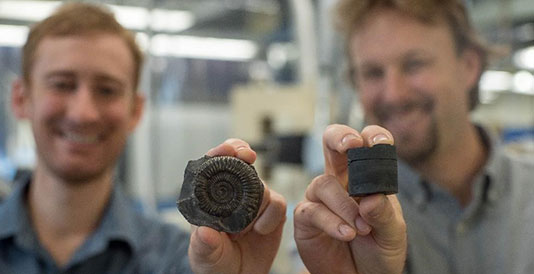 June 11, 2018 (Source: FSU) - Global climate change, fueled by skyrocketing levels of atmospheric carbon dioxide, is siphoning oxygen from today’s oceans at an alarming pace — so fast that scientists aren’t entirely sure how the planet will respond. Their only hint? Look to the past. In a study published this week in the journal Proceedings of the National Academy of Sciences, researchers from Florida State University did just that — and what they found brings into stark relief the disastrous effects a deoxygenated ocean could have on marine life. Millions of years ago, scientists discovered, powerful volcanoes pumped Earth’s atmosphere full of carbon dioxide, draining the oceans of oxygen and driving a mass extinction of marine organisms.“We want to understand how volcanism, which can be related to modern anthropogenic carbon dioxide release, manifests itself in ocean chemistry and extinction events,” said study co-author Jeremy Owens, an assistant professor in FSU’s Department of Earth, Ocean and Atmospheric Science. “Could this be a precursor to what we’re seeing today with oxygen loss in our oceans? Will we experience something as catastrophic as this mass extinction event?”
June 11, 2018 (Source: FSU) - Global climate change, fueled by skyrocketing levels of atmospheric carbon dioxide, is siphoning oxygen from today’s oceans at an alarming pace — so fast that scientists aren’t entirely sure how the planet will respond. Their only hint? Look to the past. In a study published this week in the journal Proceedings of the National Academy of Sciences, researchers from Florida State University did just that — and what they found brings into stark relief the disastrous effects a deoxygenated ocean could have on marine life. Millions of years ago, scientists discovered, powerful volcanoes pumped Earth’s atmosphere full of carbon dioxide, draining the oceans of oxygen and driving a mass extinction of marine organisms.“We want to understand how volcanism, which can be related to modern anthropogenic carbon dioxide release, manifests itself in ocean chemistry and extinction events,” said study co-author Jeremy Owens, an assistant professor in FSU’s Department of Earth, Ocean and Atmospheric Science. “Could this be a precursor to what we’re seeing today with oxygen loss in our oceans? Will we experience something as catastrophic as this mass extinction event?”











